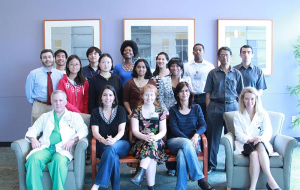A key concern among women who undergo a mastectomy is about body image. Reconstruction surgery is life-altering, and often presents profound challenges to women who are breast cancer survivors and required to make multi-faceted decisions that impact their lifestyle, values, preferences, mental health, among other personal considerations.
Supported by a $3,402,297 five year research project grant (R01) from the National Institutes of Health (NIH), Fatima A. Merchant, PhD and associate professor in the department of engineering technology, with joint appointments in computer science, electrical and computer engineering, and biomedical engineering at the University of Houston (UH), will serve as one of the principal investigators on a multiple-PI team that includes Dr. Mia Markey from the University of Texas at Austin, and Dr. Michelle Fingeret from MD Anderson Cancer Center. The team's expertise ranges from engineering and informatics to reconstruction surgery, clinical psychology, and decision science.
Dr. Merchant's research interests are in the areas of computational biology and medicine, with a focus on medical imaging and image analysis. Prior to joining UH, she was lead scientist and principal investigator at a small business specializing in biomedical imaging, where she developed automated optical imaging systems, biometric systems, and an extensive array of software tools for two and three-dimensional (2D and 3D) imaging.
The study, 3-D Modeling-based Decision Support for Optimizing Quality of Life Following Breast Reconstruction, promises to radically enhance the consultation process for women undergoing breast reconstruction surgery, and aims to provide an informed decision support system that enables them, in consultation with their healthcare providers, to choose the reconstruction strategy that best suits them personally. The team's research will bring greater clarity to a decision-making system based on quantitative models that tailor the presentation of breast reconstruction outcomes specific to each patient. With prior NIH support, the team implemented a longitudinal study of 500 women who underwent breast reconstruction; the interdisciplinary team established a unique knowledge base using 3D image analysis, biomechanical modeling and simulation, and machine learning. As a team, they will develop predictive algorithms for combining the knowledge base and patient specific information, and communication mechanisms that gather vital patient specific information and for delivering information about the decision to the patient and her multidisciplinary care team.
The evolving decision support system will be evaluated during the consultation process. The measure of success will be whether patients report less decisional conflict after consultation using the system than prior to consultation. Also, the effect of the system on short-term outcomes of breast reconstruction related to decision-making such as decisional conflict, decision regret, anxiety, and distress will be measured.
Dr. Merchant will be responsible for the oversight and coordination of project management involving the design and development of a 3D modeling and visualization framework. She will collaborate with Dr. Mia K. Markey, professor, biomedical engineering, at the University of Texas at Austin and adjunct professor, imaging physics at the University of Texas MD Anderson Cancer Center and supervise the activities of a graduate research assistant and software engineer in consultation with the other principal and senior investigators. Dr. Michelle C. Fingeret, associate professor, Departments of Behavioral Science and Plastic Surgery at MD Anderson Cancer Center, is a licensed psychologist who will focus on body image issues. Co-Investigators include Dr. Scott Cantor, professor, Department of Health Services Research, MD Anderson Cancer Center, Dr. K. Ravi-Chandar, professor, Department of Aerospace and Engineering Mechanics, University of Texas at Austin; and Dr. Gregory P. Reece, professor, Department of Plastic Surgery, MD Anderson Cancer Center.
